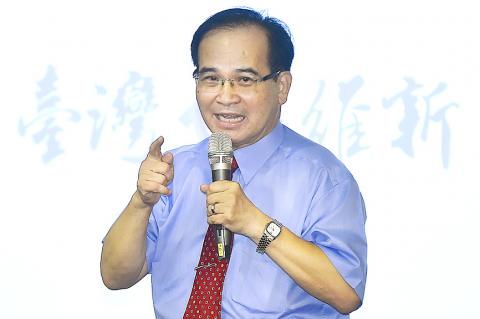The Taiwan Renewal Party (台灣維新黨) was formally founded yesterday, announcing aims to restrict the central government’s power and reform taxation.
The party would push for a tax-sharing system similar to that introduced by Germany and later adopted by China, Taiwan Renewal Party convener Su Huan-chih (蘇煥智) told a news conference in Taipei to mark the party’s founding.
Local governments would ideally receive half of profit-seeking enterprises’ income tax and business tax — which currently go to the central government — allowing them to promote more policies and developments, Su said.

Photo: Chen Chih-chu, Taipei Times
This would incentivize local governments to attract investment, thereby boosting local economies, said Su, a former Tainan County commissioner who left the Democratic Progressive Party (DPP) in March last year.
The Taiwan Renewal Party would seek to restrict the central government’s jurisdiction and give local governments more autonomy, he said.
For instance, the six special municipalities could hold district director elections and allow each district to have more say on its own affairs, rather than have the mayor distributing all the resources, he said.
National affairs are decided by a handful of policymakers and young people often feel powerless and depressed, as they are not given the opportunity to use their talent to benefit the nation, he said, adding that if a proportional representation system were adopted for local elections, capable young people would be more motivated to enter politics.
The party would nominate at least 10 candidates for next year’s legislative elections, Su said.
He said that he did not form the party in pursuit of power or profit, but to reform the nation.
President Tsai Ing-wen (蔡英文) during her first presidential campaign in 2012 raised the idea of a “Taiwan consensus,” but did not define what she meant by “consensus,” he said.
The consensus is that Taiwan, or the Republic of China (ROC), is an independent nation, the future of which should be decided by its 23 million people, he said.
More than 80 percent of Taiwanese accept either the ROC or Taiwan when referring to the nation, so people should not dwell on the matter, he said.
Most people care about how the economy can be reinvigorated and how underprivileged people can be cared for, Su said, adding that he and Hon Hai Precision Industry Co founder Terry Gou (郭台銘) think similarly in this regard.
Asked if he would support Gou if he ran for president, Su said that he welcomes all like-minded candidates.
The Taiwan Renewal Party’s ideals partially align with Gou’s, as he also wants to restore the ROC’s glory and find an answer to people’s frustrations, Tsai Chin-yu (蔡沁瑜), deputy chief executive of Gou’s Yonglin Foundation, said at the event.
Asked whether his party supports Tsai’s re-election bid, Su said: “We are just small potatoes, so does it matter?”

Taiwan is stepping up plans to create self-sufficient supply chains for combat drones and increase foreign orders from the US to counter China’s numerical superiority, a defense official said on Saturday. Commenting on condition of anonymity, the official said the nation’s armed forces are in agreement with US Admiral Samuel Paparo’s assessment that Taiwan’s military must be prepared to turn the nation’s waters into a “hellscape” for the Chinese People’s Liberation Army (PLA). Paparo, the commander of the US Indo-Pacific Command, reiterated the concept during a Congressional hearing in Washington on Wednesday. He first coined the term in a security conference last

A magnitude 4.3 earthquake struck eastern Taiwan's Hualien County at 8:31am today, according to the Central Weather Administration (CWA). The epicenter of the temblor was located in Hualien County, about 70.3 kilometers south southwest of Hualien County Hall, at a depth of 23.2km, according to the administration. There were no immediate reports of damage resulting from the quake. The earthquake's intensity, which gauges the actual effect of a temblor, was highest in Taitung County, where it measured 3 on Taiwan's 7-tier intensity scale. The quake also measured an intensity of 2 in Hualien and Nantou counties, the CWA said.

The Overseas Community Affairs Council (OCAC) yesterday announced a fundraising campaign to support survivors of the magnitude 7.7 earthquake that struck Myanmar on March 28, with two prayer events scheduled in Taipei and Taichung later this week. “While initial rescue operations have concluded [in Myanmar], many survivors are now facing increasingly difficult living conditions,” OCAC Minister Hsu Chia-ching (徐佳青) told a news conference in Taipei. The fundraising campaign, which runs through May 31, is focused on supporting the reconstruction of damaged overseas compatriot schools, assisting students from Myanmar in Taiwan, and providing essential items, such as drinking water, food and medical supplies,

Prosecutors today declined to say who was questioned regarding alleged forgery on petitions to recall Democratic Progressive Party (DPP) legislators, after Chinese-language media earlier reported that members of the Chinese Nationalist Party (KMT) Youth League were brought in for questioning. The Ministry of Justice Investigation Bureau confirmed that two people had been questioned, but did not disclose any further information about the ongoing investigation. KMT Youth League members Lee Hsiao-liang (李孝亮) and Liu Szu-yin (劉思吟) — who are leading the effort to recall DPP caucus chief executive Rosalia Wu (吳思瑤) and Legislator Wu Pei-yi (吳沛憶) — both posted on Facebook saying: “I